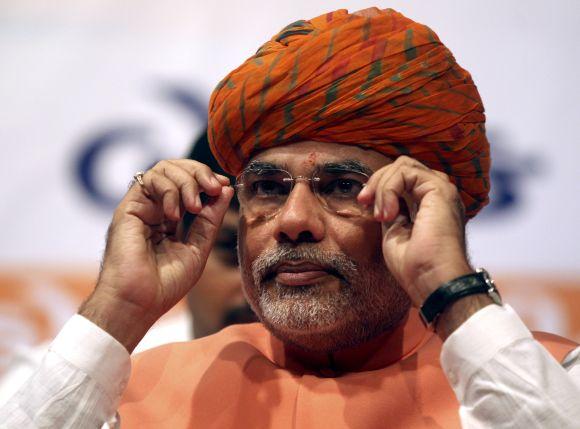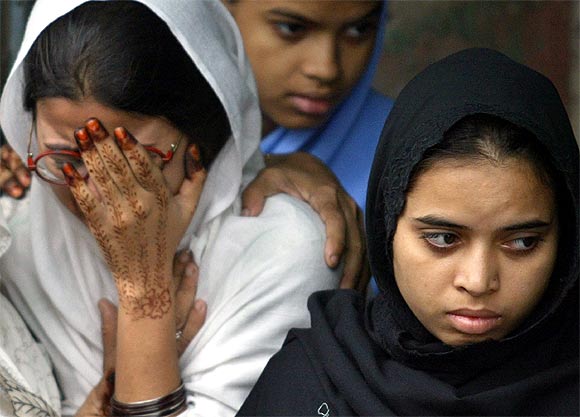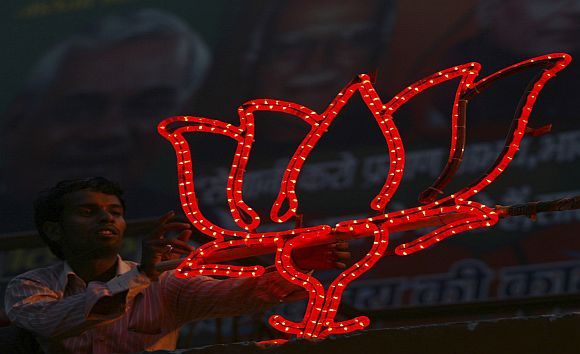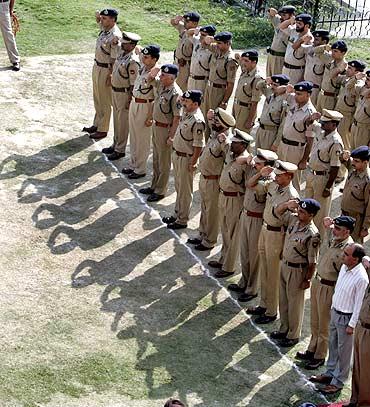 | « Back to article | Print this article |
ANALYSIS: Short-term reprieve for Modi in Ishrat Jahan case
BJP leaders in Gujarat feel that though Narendra Modi and the party will fight the allegations politically, there is no denying that the legal fight will have some political price attached to it. Sheela Bhatt reports
Gujarat Chief Minister Narendra Modi and former Gujarat Minister of State for Home Amit Shah found short-term relief on Wednesday as the Central Bureau of Investigation filed a 1,500-page charge sheet in the Ishrat Jahan encounter case.
Intelligence Bureau Officer Rajendra Kumar too has not been named as a prime accused. Kumar was portrayed by the CBI as being part of the plan and the man who supplied arms to show at the place of the murder.
The CBI claims that Ishrat Jahan, Pranesh Pillai alias Javed Sheikh, Amjad Ali Rana and Zeeshan Johar were killed by seven Gujarat policemen, attributing it to a conspiracy.
The CBI has not said anything about Ishrat having any dubious connection. Zeeeshan and Amjad are dubbed only as 'suspicious characters'.
The CBI has ensured that the criminality aspect of the seven policemen does not get diluted. They have not mentioned anything about the background of the four victims of the alleged fake encounter.
A CBI officer, while briefing the media, said, “We didn’t have a mandate to go into the credentials of the victims of the fake encounter.”
Click NEXT to read further...
Charge sheet flied by CBI under tremendous pressure
The charge sheet is quite extraordinary in other ways too. There are 19 statements of witnesses made under Section 164 before the magistrate’s court. Independently its evidential value is less but the CBI claims that corroborative evidence has been found to support these statements.
It is quite evident that the much-awaited charge sheet was filed under tremendous pressure. In any crime, the motive is the most important element to know to establish justice. The charge sheet is absolutely silent on the motive behind the crime. The question is why would policemen kill anyone or terrorists for personal motive?
The CBI has not given any answers. The CBI insists that the supplementary charge sheet will explain the 'conspiracy and motive' behind the crime and it will be filed soon. They say they want more time to probe to get conclusive evidence of the motive behind the fake encounter. This means that after filing of the charge sheet, the sword will remain hanging over Modi and Shah for a long time to come.
“As politics in India is played through legal cases since some time the charge sheet will not be taken lightly by Modi or Shah," says a senior leader of the Gujarat BJP. He is sure that Modi has nothing to worry from the CBI-led investigation. But, he agrees that, “Because motive and conspiracy is part of the CBI’s next charge sheet, Modi and Shah can’t feel safe till it is actually filed.”
Click NEXT to read further...
Modi and Shah look vulnerable
Although, so far, there is no evidence against Modi or Shah in the Ishrat Jahan case, the filing of the charge sheet itself is an acute embarrassment for the people in power in Gandhinagar.
Modi was home minister and Shah was his deputy when Ishrat Jahan 'police encounter' was allegedly planned and executed.
Modi and Shah have shown resolve and readiness to fight back legally and politically, but the law of the land makes them look vulnerable. The state BJP leaders have no doubt that Modi and Shah can and will fight back.
If any attempt of “command and control” theory is applied in the case -- which means if the CBI in its supplementary charge sheet says that the seven policemen acted on the orders of their seniors or political masters -- then Modi and his party will fight the allegations politically. However, BJP leaders feel there is no denying that the legal fight will have some political price attached to it.
There is a long way to go before the truth behind the case is known, as the charge sheet will have to stand the test of a court trial, which will not be earlier than three to four years.
The CBI has said that Zeeshan Ali was abducted by the Gujarat police in April 2004 and kept in a secret farmhouse in Gujarat. Amjad Ali was abducted in May 2004 by IB’s Rajendra Kumar and Gujarat police led by D G Vanzara. Ishrat Jahan was abducted along with her partner on June 12, 2004, from Vasad toll naka. They were kept in three different farmhouses.
Click NEXT to read further...
'A woman's killing not taken lightly by the people'
The CBI revealed in its charge sheet that an interesting meeting had taken place in Vanzara’s office on June 13, 2004, where P P Pande and Rajendra Kumar were present. They discussed if Ishrat Jahan should be killed. If it indeed happened, it's a moving episode in the terribly criminal story. The CBI has not mentioned who opposed the killing of Ishrat at that meeting. However, a senior police officer of the Gujarat police, told rediff.com that Rajendra Kumar, the IB officer, was unlikely to visit Vanzara’s office, who was far junior to him.
After the charge sheet was filed on Wednesday, many police officers and Gujarat-based politicians told rediff.com that the “brutal killing” of Ishrat Jahan has made this case sensitive. The argument goes that a “woman’s killing” is not taken lightly by people who keep silent or look the other way when so-called police encounters are reported.
From a broader point of view, the filing of the charge sheet is an important step towards justice for the family of Ishrat Jahan and other victims, who are questioning the police encounters all over India. As any crime reporter knows, most of the police encounters in India are fake but only few of them are challenged seriously and in a systematic manner.
It is too early to say if the case will send a signal to the Indian Police Service by instilling permanent fear of law in them. But the heat around it will, hopefully, help play as a deterrent in future “police encounters.”
There is no mention of the terror angle in the charge sheet.
TOP photo features of the week
Click on MORE to see another set of PHOTO features...




